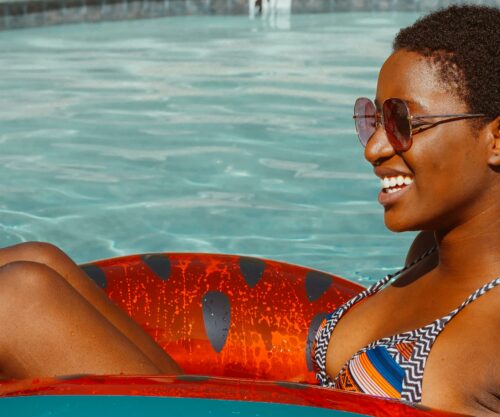
Given that relationship structures are continuously redefined and becoming more accepted in society, how can you know for sure that monogamy is for you? By Simamkele Matuntuta Pictures XX
The many faces of love: is monogamy still relevant?
Modern societal standards enforce monogamy as the most natural and acceptable relationship dynamic. This is even though several cultures practice polygamy while other people practice polyamory.
Different dynamics
Monogamy means being in a committed relationship with only one person at a time. On the other hand, polygamy is the practice or custom of having more than one spouse at the same time, while polyamory involves engaging in multiple sexual relationships with the consent of all the people involved. Polygamy can be broken down to what experts call polygyny, the most common set-up being where one man is married to multiple women. The other set-up is polyandry where a woman is married to multiple men. Furthermore, some other forms come into play such as a three-way relationship, open relationship, open marriage, hybrid relationship, situationship and friends with benefits, which all mean that there are other partners involved.
It’s a personal choice
Monogamy is as much of a personal choice as non-monogamy. A consensual monogamous relationship is a common understanding that a couple will be committed and faithful only to each other for the duration of their relationship. This is according to author, speaker and relationship expert Paula Quinsee. “Whether monogamous or polygamous, it’s a personal choice as to your relationship preference and the type you want to be in,” Paula says. Businessman Musa Mseleku, popular from the hit show Uthando Nes’thembu says even prior to knowing the meaning of polygamy, he always knew that he wanted a big family. “Growing up, I knew that I would want businesses and a bigger family; wives and kids. I was honest from the beginning about the way I wanted to live my life. When Macele (first wife) was my girlfriend, I explained to her that I would want to marry her and take another wife,” he says. On the other hand, Muvumbi Ndzalama shares that she didn’t choose to be polyamorous, and that it is who she is. “It comes naturally to me. I currently have a primary partner – the person I live with and have children with. But, I have other partners while my partner also has others.” Top Billing presenter and model Harmony Katulondi shares that he has always been in monogamous relationships because he believes in trying his all to give the best of himself to the person he is with. “Sometimes I feel that polyamory and polygamy is asking for a licence to cheat or have an affair with someone else, or maybe just an escape from commitment,” he adds. But, Paula explains that people do not get into polygamous relationships because they are unhappy in their current relationship. “Rather, it is a case of being able to love multiple partners with all of them agreeing to the relationship.” Although monogamous couple Trevor Kamoto and Ntomby Mndaweni believe that monogamy is the safest option when you consider all the risks that come with having multiple partners, they acknowledge that it may not be for everyone.
It is a choice
Monogamous couples deal with a lot of infidelities for various reasons. This is usually because people tend to think that the grass is greener on the other side, according to talk show host, author, facilitator and life coach Thandi Vellem. “We are pushed by curiosity to explore. Unfortunately, that kind will not work because people want the security and stability of being committed and committed to,” she says. But, Thandi explains that polygamous and polyamorous relationships work on the same basis of common values that monogamous relationships work on. “This is because they’re okay with being in those spaces.” Paula further explains that we love in different ways as we grow, evolve and mature. And because of that, people may decide to choose a different lifestyle than the one they previously led.
Monogamy vs non-monogamy
Both Paula and Thandi agree that no relationship dynamic is better than the other, and that there’s no definitive answer on whether monogamy works or doesn’t as opposed to non-monogamous ones. “It is a case of personal beliefs and whether you are prepared to put in the effort to make them work,” Paula says. It all boils down to the value system; you can’t have values that clash, according to Thandi. Musa agrees, saying that polygamy works for people who have the same vision, choose to lead this type of lifestyle and constantly communicate their wants, needs and expectations with all relevant parties. He also says it works because there’s honesty and respect, unlike in monogamous relationships where there are opportunities of cheating, which means a partner could end up spending more time with a side partner than the primary one. “To maintain a girlfriend or mistress is expensive,” he quips. He also adds that polygamous families are built in such a way that they grow and benefit from shared responsibilities and resources. Muvumbi shares that being in a polyamorous relationship is consensual and ethical, and built on things such as virtues, truth and communication. “I love all my partners. Everyone brings something different; it’s the same with family, siblings or friends. We have different relationships with each of them.” Paula adds that there’s no one-size-fits-all approach to any type of relationship, even with non-monogamy. “The key is that it is clear to all involved, transparent and with defined rules or boundaries.” She says the downside could be feeling jealous, insecure, juggling time/schedules spent with each partner, sexual health risk factors, managing expectations, dealing with conflict, miscommunication and not having the emotional maturity to deal with non-monogamous relationships or partners. “It takes courage to want to explore open relationships; how to work through potential feelings of jealousy or feel supported by your partner and above all, the importance of love and honesty. It is no different for monogamous relationships where we should prioritise communication, honesty, transparency, and collaborate and respect each other. These same things are important in any relationship,” Paula says.
SEE ALSO: Fling or something serious?
Committing to one person for the rest of your life is a conscious decision that you have to make. And, if that isn’t something you are satisfied with, that’s okay because everyone is different, and there are various options available for you to choose from.




